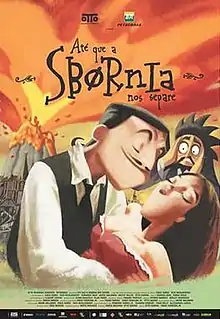Até que a Sbórnia nos Separe
Até que a Sbórnia nos Separe (Portuguese for Til Sbornia Do Us Part) is a 2013 Brazilian adult animated dark comedy film directed by Otto Guerra and Ennio Torresan Jr, based on the play "Tangos & Tragédias", presented on stage since 1984.[1] The creators of the play, Nico Nicolaiewsky and Hique Gomez, are credited for the voice of some characters and the movie soundtrack.[2]
| Até que a Sbórnia nos Separe | |
|---|---|
 Theatrical release poster | |
| Directed by | Otto Guerra Ennio Torresan Jr |
| Screenplay by | Rodrigo John Tomas Creus |
| Produced by | Otto Guerra Marta Machado |
| Starring | Hique Gomez Nico Nicolaiewsky Otto Guerra André Abujamra |
Production company | Otto Desenhos Animados |
Release dates |
|
Running time | 83 minutes |
| Country | Brazil |
| Language | Portuguese |
| Budget | R$ 4,000,000 |
The film follows the consequences of the accidental fall of the wall that separates a small country called Sbórnia from the rest of the world, and the culture shock that the protagonists, Kraunus and Pletskaya will face.[3]
Plot
Sbórnia is a small country that has always been isolated from the rest of the world, surrounded by a large wall that does not allow its contact with the neighbors. One day, however, an accident leads to the fall of the wall, and later the sbornians begin to discover the modern customs. Two local musicians, Kraunus and Pletskaya, observe the reactions of their countrymen: while some quickly adopt foreign culture, others prefer to reaffirm the sbornians traditions and resist imperialism.[4]
Cast
- Hique Gomez
- Nico Nicolaiewsky
- Otto Guerra
- André Abujamra
- Arlete Salles
- Fernanda Takai
Music
The composer André Abujamra used the songs "Copérnico", "Desgrazzia ma non troppo", "Epitáfio" and "Aquarela da Sbórnia" from the play "Tangos e Tragédias", in which the film was based. Two other songs are part of the soundtrack: "Trevo de Quatro Folhas", by Nilo Sérgio, Mort Dixon, Harry Woods and "Rosa", by Pixinguinha and Otávio de Souza.[2]
Accolades
| Award | Category | Recipient(s) | Result |
|---|---|---|---|
| Gramado Film Festival[5] | Audience Award - Brazilian Competition | Otto Guerra Ennio Torresan Bernard Attal |
Won |
| Golden Kikito - Best Art Direction | Eloar Guazzelli Filho Pilar Prado |
Won | |
References
- "41º Festival de Gramado - Cinema Brasileiro e Latino". Archived from the original on 2013-12-20. Retrieved 2013-10-13.
- Até que a Sbornia nos Separe : Curiosidades - AdoroCinema
- Correio do Povo | Arte & Agenda | "Até que a Sbórnia nos Separe" é destaque no Festival de Gramado
- Até que a Sbórnia nos Separe - Filme 2013 - AdoroCinema
- "Tatuagem confirma favoritismo e vence Kikito de melhor filme – Gramado – Jornal de Gramado". Archived from the original on 2016-03-04. Retrieved 2013-10-13.
External links
- Official website
- Até que a Sbónia nos Separe at IMDb
- Até que a Sbónia nos Separe at The Big Cartoon DataBase